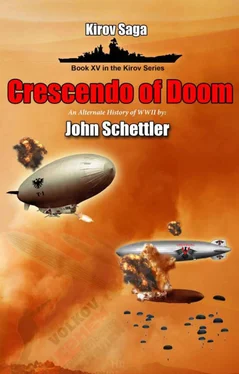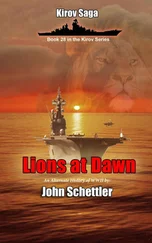The German operational art, the balance of tanks, AFVs and supporting weapons in their units, the training and skill of their troops, all weighed in their favor. At one point in the line, along the Bug River at Pratulin, the Germans would employ a devious tactic that surprised their own troops as well as the enemy—the tauchpanzers .
The old canceled plans for Operation Seelöwe had envisioned the offloading of tanks in water up to 25 feet deep on the English coast, and an ingenious method was devised to permit that, and allow the tanks to advance on the sea floor itself to reach the shore. Special adhesives were used to seal off the tanks to water penetration, inner tubes surrounded the wide seam between the turret and tank body, and a long snorkel was attached to the tank to feed air to the crews. The gun barrels were plugged with a rubber cap. Blind under water, the tanks were to be steered by using a compass. To prevent water in the exhaust, a one way valve was attached there.
To test the principle, tanks were rigged out and ferried out to sea near the Island of Sylt, then sent down long ramps into the water to the sea floor below, where they would attempt to drive to the nearby shore. When the invasion of England was cancelled, the units trained were sent off to form a regular panzer regiment, but the special conditions at Pratulin reminded a staff officer that they might just wade their tanks right beneath the river, and catch the enemy by surprise. It worked as planned. Manfred Graf Strachwitz led the attack of the 18th Panzer Regiment, with the German infantry gawking at the tanks as they lumbered down the muddied river bank, and disappeared beneath the water.
In later years the idea of amphibious tanks would become more common, but this was a first, and it achieved the desired surprise when the Germans literally drove 80 tanks under the river, instead of trying to get bridging units in place under heavy enemy fire.
In most places, the tried and true methods would be used, and the art of rapid cross river assault had been perfected in France during the rapid advance of the Panzer forces there. In the south, these defended river lines were arrayed one after another, a series of natural water barriers formed by the Southern Bug, Prut, Nistru, Danube, Dniester and Dnieper all forming major obstacles to rapid forward movement.
But here the Germans had reorganized their plans to put those “good German divisions” on the line, pulling the Liebstandarte, Das Reich and Totenkopf units together into one korps, and adding a new unit that was not in any order of battle Fedorov could read about. Hitler had been so pleased with the performance of Grossdeutschland at Gibraltar, that he order the formation of another “Sturm” division, with its units built around cadres of the elite Brandenburgers. So it was that the “Brandenburg Motorized Division” came into being, and would lead the attack of the SS Korps as a specialized infiltration and breakthrough unit. Instead of snorkeling tanks, the highly trained and daring officers of the old Brandenburg commandos would lead the way, with the best troops in Germany behind them.
And this also worked as planned…
Volkov’shands tightened on the hand rails of his armored capsule when the explosion rocked his ship. The RS82 rockets struck the tail of Big Red, and the resulting explosion was so violent that Orenburg had been dealt a fatal blow. The fireball had expanded to sear the side of the great airship, where it had been hanging in the skies no more than 200 meters above Krasny , in a perfect position to blast that ship to pieces. The fleet flagship had turned smartly, its rapid descent corrected, and was just beginning to climb again when the explosion occurred. Within minutes, the gashes torn in Orenburg’s side by a hundred fragments of Big Red’s shattered duralumin frame, had fatally compromised the ship’s buoyancy.
Through the chaos of that moment, as the airship rolled in the sky, fires spreading rapidly to engulf its tail and rudders, Volkov heard his Security Chief shouting frantically over the voice tube to his capsule.
“Sir! Are you all right down there?”
“What’s happening?” Volkov had shouted back, though he knew very well what was happening. He could feel the ship shuddering in the sky, hear the hiss of helium escaping from the lacerated gas bags, feel the queasy roll of Orenburg as the flight crew struggled for control. The sight of Krasny falling from the sky was a chilling prelude to what was now about to happen to his own ship. They were going down, and Volkov gritted his teeth, his eyes searching frantically for the overhead lever that would eject his capsule into free fall so that he could escape.
“Kymchek! I’m using the escape pod! Save yourself! Get off the ship, and by god, if you make it out alive round up every man you can find and get a security detail to my landing site.”
He reached for the lever, never thinking a moment like this would come. He had always been above the heat of combat, immune to the violence he set in motion with his iron will. Now his pulse was rising with the thought that this emergency system had never been used before. What if it failed to operate? What if the parachute would not deploy? He could be plunging to his death at that very moment, but there was nothing else to be done.
He found the lever, pulled hard, and was relieved when the securing clamps released, and the weight of the capsule allowed it to fall freely away from his burning ship. Agonizing seconds passed, then the sharp tug of the chute deployment stilled his fear, and he eased back, collapsing against the bulkhead and gaping out the observation window, seeing burning fragments of the chaos above falling like molten rain. A man fell screaming, then another. Some were saved as their parachutes also deployed, though he saw one chute suddenly engulfed in flames from the falling burning cinders. Crew members from both the stricken airships were leaping for their lives, each with the same hope and fear that wrenched his own chest.
Seconds passed, and he finally realized, with great relief, that his parachutes were going to hold. The capsule was descending through a grey-white cloud, and then it broke through, allowing him to see the green rolling taiga below. All he had to do now was survive the landing.
“Damn you, Karpov!” he swore, venting his emotion. “I’ll see that you burn in hell!” He realized now what must have happened. Big Red was the same ship that dropped that terrible fire bomb on his troops some months ago. And he had seen Karpov use the weapon again, savaging the ships of the Caspian Division and sending Salsk and Sochi to a fiery end. There must have been another bomb aboard Krasny , mounted in the tail cargo holds. My God! He fired those rockets at his own ship this time, just so he could detonate that weapon. I will never underestimate that man’s black heart and soul again!
Down he went, falling until the capsule plunged into a stand of trees, in a wild moment of snapping branches. But the woodland actually helped to cushion his fall, which might have been much rougher had he struck some rocky clearing, or worse, fallen into a marshy tundra bog. In one last chaotic moment, he tumbled down through the stand of trees until his chute, tangled on the upper branches, brought his descent to a sudden halt. He was thrown to one side, his shoulder bruised, but then it was over.
There, in that relative silence, he cursed his enemy a hundred times, and bewailed his own fate as he did so. How could he have allowed this to happen to him? He was Ivan Volkov, Secretary General of the Orenburg Federation! He should still be up there, high above the storm, sipping his brandy and receiving reports of the destruction of the Siberian Fleet, but Karpov, damn his soul, had literally come from nowhere to ambush his ships just as victory was within his grasp. How could this happen?
Читать дальше












